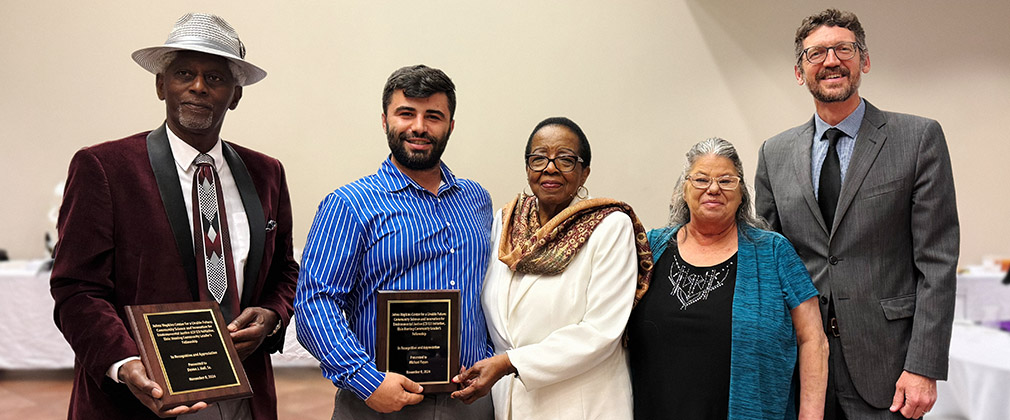Supporting Leaders and Building Capacity in Fenceline Communities
Over three decades, Elsie Herring became a legend in Duplin County, North Carolina, and she remains so, even four years after her death in 2021. Herring, an environmental activist, was one of the most outspoken critics of the state’s hog industry, and she spoke out for rural communities grappling with the difficulties of living near massive industrial swine operations. She testified in federal lawsuits against Smithfield Food, and she was featured in Right to Harm and The Smell of Money documentaries about the adverse impacts of factory farms. The great- granddaughter of a person who was once enslaved, she lived in Duplin County on land that has been in her family since 1891.
It is in her name that the Johns Hopkins Center for a Livable Future created a fellowship intended to build capacity of organizations on the front lines of environmental justice impacts related to industrial food animal production. It is one piece of the Community Science and Innovation for Environmental Justice (CSI-EJ) Initiative, led by associate professor and affiliated CLF faculty Chris Heaney. The Initiative aims to respond to community-identified concerns of industrial food animal production workers and community advocates across North America who request collaboration and coordination on strategic research-to-policy and legal reform.
On November 9, 2024, CLF and the CSI-EJ Initiative announced its inaugural Elsie Herring Community Leader Fellows, which has two tracks—a senior mentor/transition track, and a junior/next generation career development track. The fellowship intends to support critical activities with regard to priorities for industrial food animal production reform, pandemic pathogen spillover, concerns with factory farm gas (also known as biogas) infrastructure, and policy and legal reform.
Devon Hall, Executive Director of the Rural Empowerment Association for Community Help (REACH), was named as the Senior mentor/ transition track fellow. In this role, he will receive critical support in successfully navigating a transition and/or succession planning so that he can hand off leadership responsibilities to a successor. Successful hand-off to the next generation of leadership requires protected time and resources to identify, recruit, train, and mentor the younger generation.
Michael Payan, Director of Operations of Sussex Health and Environmental Network (SHEN) and Sentinels of Eastern Shore Health (SESH), was named as the Junior/ next generation career development track fellow. In this role, he will benefit from support and protected time for the training, capacity building, and career development of a junior community leader who will provide the next generation of leadership for fenceline, community-based organizations.
The awards were announced and new roles begun at a banquet and community celebration of REACH in Warsaw, North Carolina. The Elsie Herring fellows will have a mutually supportive relationship with the Steve Wing track of the CLF-Lerner Fellowship program. This track embraces a community-based participatory research approach to address the environmental injustices and public health impacts associated with industrial food animal production.
Image: Devon Hall (far left) and Michael Payan (next to Mr. Hall) receiving the Elsie Herring Community Leader Fellowship award, with Laura Hall (center), Maria Payan (second from right) and Dr. Chris Heaney (far right). Nov 9, 2024, Warsaw, North Carolina.
